Diabetes patients may not have to go to the clinic to have their blood sugar levels checked in future, as they can do so at home through remote technology - another arsenal in the "war" against diabetes.
Such is the concept of the diabetes clinic of the future, an approach which will be adopted at SingHealth's Diabetes and Metabolism Centre at Singapore General Hospital (SGH). The centre will tap smart technologies to improve diabetes care, from risk prediction to the monitoring, treatment and management of the disease. For instance, apps can be used to track what patients eat. This information can then be sent to doctors to monitor patients' conditions.
Dr Benjamin Seet, executive director of A*Star's biomedical research council, said the data collected would eventually be used in studies to improve patient care. Researchers hope to apply this smart technology approach across the whole healthcare system, he added.
The use of technology to care for diabetes patients is one of the initiatives under a three-year partnership signed yesterday between SingHealth and the Agency for Science, Technology and Research (A*Star). They will also collaborate to develop treatment for prevalent diseases in Asia, such as cancer and cardiovascular disease, and improve care for patients with these diseases.
They will work to boost research and development in immunotherapy and drug development, and harness big data for precision medicine, which looks at factors like patients' genetic information to formulate better treatment.
Yesterday's signing was witnessed by Minister for Trade and Industry (Industry) S. Iswaran.
He said: "The scientific and technical capabilities of A*Star's 18 research institutes will complement SingHealth's extensive healthcare expertise and resources to enable seamless transition of cutting-edge healthcare discoveries and applications from bench to bedside."
In Singapore, one in three people risks developing Type 2 diabetes in their lifetime. A 2015 study forecast that the total economic cost of diabetes here, including productivity loss, would more than double from nearly US$787 million in 2010 to US$1.9 billion (S$2.6 billion) in 2050.
Separately, a new academic research facility opened at the SingHealth Duke-NUS Academic Medical Centre, located at the SGH campus, yesterday. The Viral Research and Experimental Medicine Centre aims to accelerate drug and vaccine development for infectious diseases.


